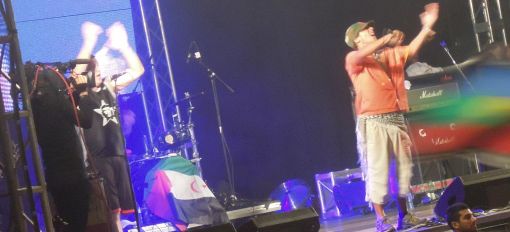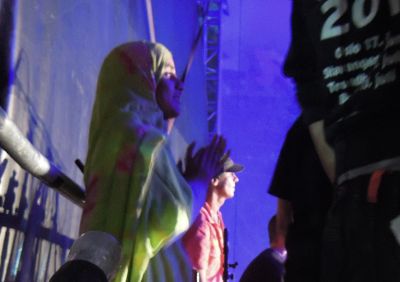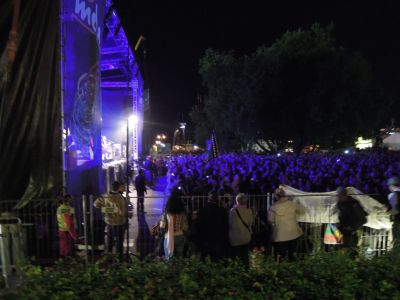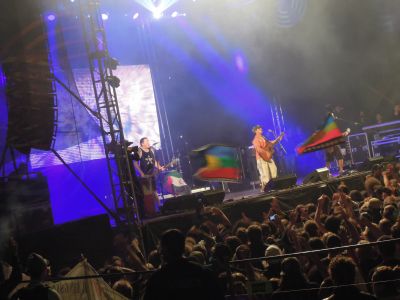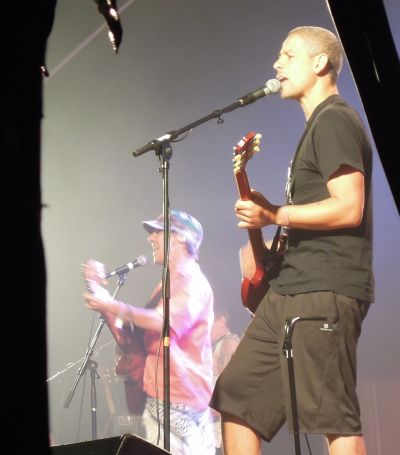
Western Sahara, Africa’s last colony, is perhaps the most clear-cut case for independence in the world today. It is unfortunately also one of the lesser known conflicts. Western Sahara has been illegally occupied by Morocco since 1975, when a weakened Spain, anxious to avoid military confrontation, had secretly relinquished Western Sahara to Morocco (and Mauritania, who left its part of Western Sahara to Morocco in 1979) in exchange for mining and fishing concessions. As an illegal occupying force, Morocco has no right to the territory of Western Sahara, and nor has it the right to sell Western Sahara’s natural resources or violate the human rights of its citizens, but must instead work towards the a referendum on the status of Western Sahara. So international law fully supports the Saharawis’ claim to independence for Western Sahara.
No country accepts Morocco’s claim to Western Sahara, on the other hand, but over 80 countries recognise Western Sahara’s exile government, the Saharawi Arab Democratic Republic (SADR). The SADR government is a member of the African Union and has a President, a Prime Minister, a judiciary, and ministerial departments and a parliament, just as any other country in the world, although because of Morocco’s occupation of most of Western Saharan territory, SADR is administrated from a refugee camp in the middle of the dessert in Western Algeria.
The Saharawi people and SADR seem to be coping remarkably well in these circumstances, although they would obviously be coping significantly better if they had access to the bulk of their resources and land that is presently colonised by Morocco. The educational level in the camps, for instance, is surprisingly high, mainly because the SADR government has made education a priority. About 90% of the population are literate, against a regional average of about 50%, a dramatic rise from the 10% literacy when the Saharawis arrived in the camps in 1975. Saharawian women are also seen as some of the most liberated in the Arab and Muslim world. And as the president of the American Defence Forum Foundation, Suzanne Scholte, concluded recently, “Western Sahara has the greatest potential of any Arab country to become a pro-Western democracy.” So why hasn’t Western Sahara been granted its independence?
There is both a purely legal and a moral case for Western Saharan independence, as well as a real-political reason that Western Sahara is still colonised by Morocco.
The legal case
There is a multitude of international court opinions, legal opinions, legal charters and UN-resolutions that support the claim of the Saharawis to Western Sahara.
The International Court of Justice rejected Morocco’s claim to Western Sahara in October 1975, a month before Morocco invaded, its opinion concluding, “that the materials and information presented to it do not establish any tie of territorial sovereignty between the territory of Western Sahara and the Kingdom of Morocco.” Self-determination for Western Sahara (defined as the right of a people to a free choice) constituted a “basic assumption of the questions put to the court”, and even a positive finding of ties of territorial sovereignty between Western Sahara and Morocco would therefore not have overrided the self-determination process.
The illegality of Morocco’s presence in Western Sahara has been maintained by the UN Security Council and the UN General Assembly in over 100 resolutions, especially General Assembly resolution 1514 that states that “all peoples have the right to self-determination; by virtue of that right they freely determine their political status and freely pursue their economic, social and cultural development” and that “immediate steps shall be taken, in Trust and Non-Self-Governing Territories or all other territories which have not yet attained independence, to transfer all powers to the peoples of those territories, without any conditions or reservations, in accordance with their freely expressed will and desire, without any distinction as to race, creed or colour, in order to enable them to enjoy complete independence and freedom.” Resolution 1514 was declared applicable to the case of Western Sahara by UN General Assembly Resolution 2229.
The Charter of the United Nations (article 3) also clearly states that those nations who are “responsible” for non-self-governing states, such as Western Sahara, must “ensure … their just treatment, and their protection against abuses,” “take due account of the political aspirations of the peoples,” “promote constructive measures of development,” and “transmit regularly to the Secretary-General for information purposes,” none of which Morocco can be said to be doing presently.
Morocco’s instigation of the “Green March” in late 1975, where over 300.000 civilian Moroccans marched into Western Sahara was clearly in breach of the 4th Geneva Convention’s article 49 that states that “the occupying power shall not deport or transfer parts of its own civilian population into the territory it occupies.”
Self-determination of nations such as Western Sahara, including their natural resources, was recognised as a principle in article 1, paragraph 2, of the International Covenant on Economic, Social and Cultural Rights, that reads “All peoples may, for their own ends, freely dispose of their natural wealth and resources … based upon the principle of … international law. In no case may a people be deprived of its own means of subsistence.” Regarding Western Sahara’s resources, former Under-Secretary General for Legal Affairs, Hans Correll’s UN Opinion from 2002 concluded that the selling of Western Sahara’s resources was only legal if the population of Western Sahara agrees to and benefits from it, something a European Parliament Legal Opinion from 2009 and numerous statements from Sahrawi Arab Democratic Republic, Western Sahara’s government in exile, conclude they do not. Correll has recently reiterated this conclusion, saying, “if the [fisheries] agreement is not signed with the interest of the people of Western Sahara, or after consultation with them, and the benefits do not go to the people of the territory, then it would be in violation of international law. I am afraid we have this situation in this case now.” Morocco’s selling of Western Sahara’s huge deposits of phosphate, and the Fisheries Partnership Agreement that Morocco has agreed with the European Union, where the EU pays Morocco 36.1 million Euros annually to allow EU vessels to fish in its waters, is therefore illegal.
Several UN-resolutions have also specifically called for Morocco to grant Western Sahara its independence. UN General Assembly Resolution 34/37, 1979, paragraph 5, for instance, “deeply deplores the aggravation of the situation resulting from the continued occupation of Western Sahara by Morocco”, while paragraph 6 specifically calls upon Morocco to “… terminate the occupation of the territory of Western Sahara”
The moral case
Apart from the purely legal argument for Western Saharan independence there is also an equally strong moral argument, especially in regard to the way the Moroccan regime treats the Saharawis.
The Human Rights situation in occupied Western Sahara is highly reprehensible, something that many Human Rights organisations have accounted for in numerous reports and other publications. Human Rights Watch speaks of Moroccan authorities acting with “impunity” and the ”evidence of torture and serious mistreatment” against the indigenous population of Westerns Sahara, the Saharawis; International Crisis Group speaks of the Moroccan regime’s “disproportionate use of force” and it “frequently resorting to torture and arbitrary arrests;” and Amnesty International speaks of Saharawis being “subjected to forms of torture and other cruel, inhuman or degrading treatment – including rape.”
Morocco has brutally clamped down on anyone within occupied Western Sahara who dares dispute its rule, however peacefully. One of the more recent and widely publicised examples of this was the Moroccan clamp down on the Saharawi Gdaim Izik protest camp in occupied Western Sahara in November 2010. Shortly hereafter, the European Parliament passed a resolution that “expresses its greatest concern about the significant deterioration of the situation in Western Sahara and strongly condemns the violent incidents which occurred in Gdaim Izyk camp while it was being dismantled and in the town of Laâyoun”. The resolution also “deplores the loss of human life” during Morocco’s brutal raid on the peaceful protest camp of Gdeim Izik, and insisted that the parliament is generally “concerned” about the human rights situation in Western Sahara.
The situation of the over 150.000 Saharawis that have lived in refugee camps outside Western Sahara since 1975 is equally reprehensible. A Moroccan-built wall, “Berm” or “wall of shame” as the Saharawis call it to, spans the entire length of Western Sahara, dividing the resource-rich occupied part from the SADR-controlled part. It is manned by thousands of soldiers and is heavily mined with around six million mines. The wall was and is an attempt by Morocco to protect the resources that they illegally extract from occupied Western Sahara. What it means for the Saharawis, apart from being a symbol of the occupation of their land, is that the families living in the refugee camps in neighbouring Algeria have been unable to visit their families in occupied Western Sahara for years on end as crossing from one part to the other is virtually impossible.
There are four large Saharawi refugee camps, as well as smaller satellite camps. The camps have a total population of around 165.000 according to UNHCR, although this number is disputed by Morocco for political reasons. The camps lie near Tindouf, Algeria, in an area known as “the devil’s garden” where temperatures in summer reach 50 degrees. The area has little vegetation and experiences frequent sand storms. Drinking water has to be brought in by lorry and many of those living there experience nutritional deficiencies.
The reality of realpolitik
So why has it taken so long for Western Sahara to gain its independence, when all other African countries have already gained theirs?
One obvious reason for this is that the UN Security Council is currently blocking any UN-sanctioned solution to the Western Sahara conflict. Especially the USA and France, both permanent UN Security Council members, have strategic and financial interests that have caused them to veto any UN action on Western Sahara. The USA, France and Spain, in particular, are not interested in changing a status quo that they believe they benefit from both strategically and financially. Furthermore, they are not pressured to act because Western Sahara is a low-intensity conflict and therefore doesn’t get much coverage in the press, although an increasingly vocal international civil society and increasing effective activism is beginning to draw attention to the Western Saharan conflict.
The governments and companies of the European Union, including Western Sahara’s former colonial power, Spain (Western Sahara’s de jure administrative power according to international law) in particular, benefit financially from the status quo. Amongst other things because of the huge but illegal presence of mostly Spanish fishing vessels in the waters of occupied Western Sahara and the illegal selling of other Western Saharan resources such as phosphates. The selling of these resources play an important part in enabling Morocco to continue to fund its colonisation of Western Sahara.
The USA and France have more strategic interests. The USA often publicly praises Morocco’s alleged reform efforts and France rarely publicly criticizes Morocco’s poor human rights record and openly supported its autonomy plan for Western Sahara, an attempt to make Western Sahara a permanent region within Morocco where Morocco retains power over defence, external relations and the constitutional and religious prerogatives of the Moroccan King. Morocco was one of the USA’s closest allies in their fight against communism and is one of its main allies in its fight against terrorism. Morocco was the first country to recognize the independent United States, and the two nations also signed a treaty of friendship as long ago as in 1777 (renegotiated in 1836 and still in effect). France and the USA both provide Morocco with financial aid to back up their support.
It is also obvious that independence for Western Sahara demands some sort of change within Morocco itself, as the current Moroccan regime has issues of both self-preservation and finance at stake with regards to Western Sahara. In plain language, the present Moroccan regime and its army use Western Sahara as both a diversion from its internal problems and the dissatisfaction within the Moroccan population with the regime, and as a source of considerable income.
An outstretched hand to the Moroccan people
The Saharawis apparently understand this fact. Even though Western Sahara’s national liberation movement, the Polisario Front, were at war with Morocco between 1975 and 1991, their grudge seems to be more with the undemocratic Moroccan regime, controlled by King Mohammed, than with the Moroccan people. As SADR President, and Polisario Secretary General, Mohamed Abdelaziz said in his speech on 27 February 2011 at the 35thanniversary celebrations of SADR in Tifariti in SADR-controlled Western Sahara, “we would also like to salute the Moroccan brotherly people and to assure them that the Saharawi people are their partner in the struggle for freedom, justice and the respect for human and peoples’ rights and in their common endeavour to build a united Maghreb, based on cooperation, integration, mutual respect and neighbourly relations between its peoples and countries … both Saharawi and Moroccan peoples are victims of the expansionism of the Moroccan Government that persists in curbing democracy and violating human rights”.
And no, I don’t think the conflict is doomed, although it might initially seem a little that way. The same insolvability seemed to apply to apartheid South Africa, where internal and external pressure broke the regime over the period of some years, and the North African regimes (specifically Tunisia and Egypt), where it was more internal pressure that broke the regimes (and where the outcome is obviously more unclear at present). All of these three countries looked nowhere near democratisation, from the outside at least, before it actually happened.
Peter Kenworthy is a Master of Social Science from Roskilde University. Peter has visited both the Tindouf refugee camps and in SADR-controlled Western Sahara, and has written a multitude of articles on the issue of Western Sahara.
